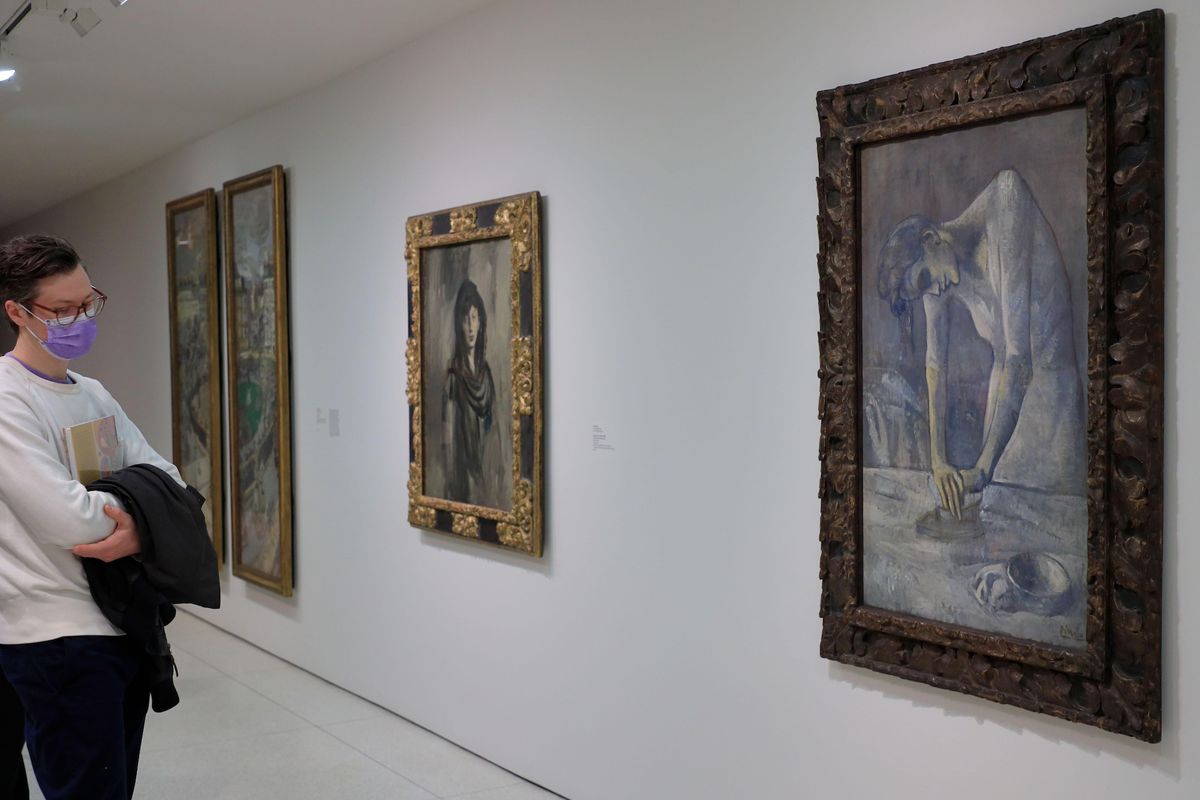Karl and Rosi Adler’s heirs had claimed that “La repasseuse” (1904) had been sold under duress as the couple fled Nazi persecution
By Benjamin Sutton, The Art Newspaper, June 19, 2024. Click for full report.

A federal judge in New York has dismissed a restitution claim brought last year against the Solomon R. Guggenheim Foundation by heirs of German Jewish collectors seeking the restitution of Pablo Picasso’s Blue Period painting La repasseuse (Woman Ironing, 1904). The lawsuit, filed by heirs of Karl and Rosi Adler, claimed that the couple had sold the painting under duress while fleeing Nazi persecution in 1938 and sought either its return or commensurate compensation of $100m to $200m.
In his decision dismissing the lawsuit on 12 June, New York Supreme Court Judge Andrew Borrok found that the claimants—eight heirs of the Adlers who are citizens of Argentina and the United States—had failed to show that the work was in fact sold under duress or coercion. He also ruled that the claimants’ appeal to the Holocaust Expropriated Art Recovery (Hear) Act of 2016 in seeking restitution failed because members of the Adler family were aware of the painting’s location and status for more than 40 years. (The Hear Act concerns the statute of limitations for bringing Holocaust restitution claims, giving heirs up to six years after “actual discovery” of their possible claim to a property to file a claim.)
Before the rise of the Nazi regime and systematic dispossession and persecution of German Jews, Karl Adler had been the chairman of the board of a leather goods manufacturing company in Baden-Baden. As the situation for German Jews worsened and the Adlers were stripped of their wealth and rights, they were forced to sell whatever they could to obtain cash and, according to the heirs’ lawsuit, sold La repasseuse to the dealer Justin K. Thannhauser for SFr 6,887 (about $1,552) in October 1938. In 1963, Thannhauser announced plans to gift prized works from his personal collection—including La repasseuse—to the Guggenheim. It is prominently displayed in Thannhauser Collection, a long-term exhibition at the Guggenheim Museum in New York featuring works from the Thannhauser bequest.
Judge Borrok noted that, as the Guggenheim Foundation has pointed out, the foundation had reached out to Eric Adler (Karl and Rosi’s son) at the time of the bequest to confirm the dates of his father’s ownership of La repasseuse. No issues about the work’s ownership or 1938 sale were raised at the time.
“The Guggenheim did not hide the source of its acquisition or otherwise fail to conduct appropriate due diligence on the painting’s provenance,” Borrok wrote in his decision. “In fact, in 1974, and prior to acquiring the painting, the Guggenheim contacted the Adlers and asked specific questions about the painting’s provenance to which the Adlers never in any way indicated that the sale was tainted by duress as the plaintiffs now allege.”
On the question of the Adlers’ 1938 sale of the painting to Thannhauser (“another German Jew whose family also fled Nazi Germany”, as Judge Borrok notes), the judge finds that the claimants failed to show that the sale was the result of “any threatened direct consequence from the Nazis or their collaborators if the sale did not occur”. The judge concludes that Thannhauser did not exert “any type of actual duress” toward the Adlers and neither party was under direct threat by the Nazi regime to make the sale under the terms by which it was carried out. “Put another way,” Judge Borrok writes, “nothing was threatened that would happen specifically if Adler refused to sell the painting to J. Thannhauser when he did or at the price he did either by the Nazis or anyone collaborating with the Nazis.”
While he dismissed their claim, Judge Borrok does note that the plaintiffs’ complaint recounts “in heart-breaking detail the devastating impact the Nazis had on the Adlers’ lives”.
The lawsuit was initiated by one of the Adlers’ great-grandchildren, Thomas Bennigson, a lawyer based in Oakland, California, who began researching the provenance of La repasseuse with the law firm Rowland & Associates in 2014. The firm was in repeated contact with the Guggenheim between 2017 and 2021, according to the complaint, and ultimately demanded its return on behalf of the Adler heirs in June 2021.
A representative for the Adler heirs declined to comment on the ruling. Spokespersons for the Guggenheim Foundation did not immediately respond to The Art Newspaper’s request for comment.
Bennigson previously sought the return of or compensation for another Picasso painting that once belonged to his relatives. In 2005 he settled a lawsuit he brought against the Chicago collector Marilynn Alsdorf over the painting Femme en Blanc (1922), with Alsdorf paying him $6.5m to retain title to the painting. In lawsuits against Alsdorf and the dealer David Tunkl, Bennigson asserted that the painting had belonged to his grandmother, Carlota Landsberg (née Adler), who had sent it to a dealer in Paris in 1933 as she was fleeing Berlin, but that it was ultimately seized by the Nazis in 1940.
